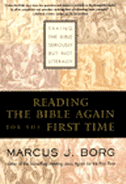Section
|
Reading the Bible Again for the First Time A Cyberspace Discussion Group Foundations: The Hebrew Bible - |

Back to Index
| It is recommended to click the Refresh or Reload button to ensure current information. |
|
 Back to Index |
| Click on the 3 sections below for materials according. | |
| SUMMARY | REFERENCES |
| READING THE CREATION STORIES AGAIN ... W. Holst Prior to the birth of Modernity in the Enlightenment of the seventeenth century, the factual truth of Genesis was accepted by both the Jewish and Christian worlds, even though its stories were not always read literally (e.g. viewed as allegory where the surface meaning stood for something deeper. The rabbis and church fathers would often engage in allegorization). Attempts were made to use the Bible to date the age of the earth (cf. James Ussher) but conflict over the reading of Genesis intensified when Charles Darwin proposed his theory of evolution in 1859. The nineteenth century was a time of significant conflict between science and the Bible. That controversy continues to this day when 'creationist' believers challenge those who question the Bible as a source of scientific theory. Contemporary biblical scholarship does not read the creation stories of Genesis as historically factual accounts of the world's beginnings. It is possible to read these stories again, for the first time, using the lens of historical scholarship and with sensitivity to their meanings as metaphorical narratives whereby they can be seen as profoundly true though not factually so. They are not God's stories of the world's beginnings. Rather, they are ancient Israel's stories of the world's beginnings. The 'P' Story (Priestly Tradition) focuses on the creation of the universe, the world, and finally humans. God does this in six days and rests on the seventh day. Even God rests on the Sabbath! Because the ancient Hebrews observed Sabbath as a sign of identity, this story lent credibility to their practice. The P account is poetry and praise to God the Creator. It not meant to be read as a scientific treatise. The 'J' Story (Yahweh Tradition, Yahweh is used for the name of God) focuses on the creation of humankind and barely treats the creation of the world. In this account, a snake tempts the primeval couple to eat fruit from a forbidden tree. Their lives change dramatically and they are exiled from the Garden of Eden. These stories were told by the people of ancient Israel not so much as primitive science ('how did we get here?') but to express their deepest convictions about God and the world and about 'human nature' (why we are as we are). Adam (dust) means humankind in the generic sense. His story is one of partnership with the story of Eve (life). The Genesis stories are myths, or metaphorical narratives about the relationship between this world and the sacred. Myth and reality go together. Myth, however is not falsehood. It describes what is ultimately real. Myth is a form of poetry which transcends poetry in that it proclaims a truth. The basic message of the creation stories of Genesis is that God is the source of everything that is. In some interpretations, God is the Infinite Designer, the cause of the Big Bang. But to say "God is creator" affirms a relationship and a process that continues into the present. It need not refer to a specific event in the past. Thinking about creation this way means that God as maker of heaven and earth is compatible with any scientific account of the universe's origins. Genesis and science do not need to be competitors. Science deals with the 'how' questions. Genesis deals with 'Who' and 'why' questions. God may be viewed as creating the universe separate from Godself (creation occurred in the past) or from out of God's own being (creation is ongoing). The Genesis stories are creation-affirming (All that is, is good). Humans were created in the image of God, but they are also dust-creatures. We are special, but we are also fallen. 'The Fall' is a Christian characterization, not a Hebrew one. Something went wrong with creation that needs righting. What went wrong? (disobedience? pride? sloth? (letting someone else author one's existence) birth of consciousness?) We all go through the fall and live in a state of exile and extrangement from God 'East of Eden' as a result. The Genesis creation stories are profoundly true. Their truth is expressed in the non-conceptual language of myth and metaphor and no particular reading can exhaust their meanings. |
||
| S U M M A R Y |
ONE | Contemporary biblical scholarship does not read the creation stories of Genesis as historically factual accounts of the world's beginnings. |
| TWO | The Genesis stories are myths, or metaphorical narratives about the relationship between this world and the sacred. | |
| THREE | The Genesis creation stories are profoundly true. Their truth is expressed in the non-conceptual language of myth and metaphor and no particular reading can exhaust their meanings. | |
 |
St. David's United Church.Calgary, Alberta, Canada.
The United Church of Canada.
September 30, 2001. feb 22, 04